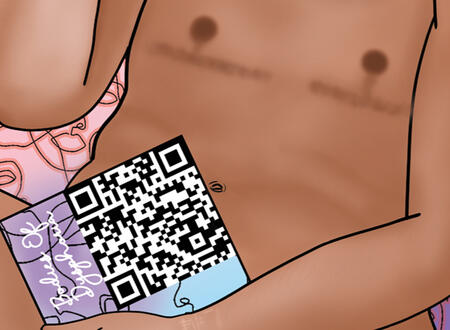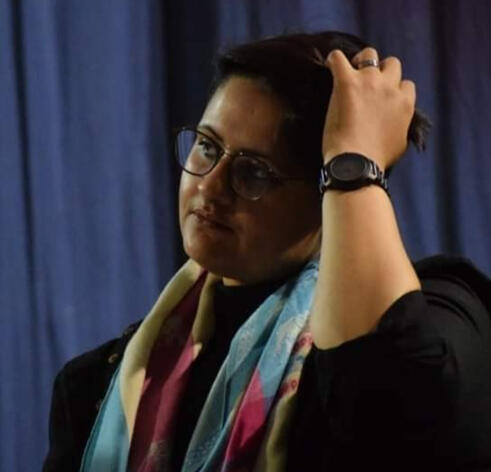Bodies of dysphoria
Personal is Political. This phrase cannot be any truer when talking about transgender lives. Our community, our lives and our bodies are discussed and debated like political opinions forgetting the humanity of the individuals involved. Trans bodies are medicalised, debated, studied, and brutalized. They are constantly subjected to a cisgender gaze, often shaming us and trying to push us into biological boxes that make no sense. This work is an attempt at exploring the relationship trans folx have with their own bodies. It is also a multiple media project that gives access to the audience to engage with the ideas and thoughts of trans folx who have shared their stories directly, traversing into every layer of meaning with art, audio, and words.
*TRIGGER WARNING: self-harm, body image issues, dysphoria, depression, anxiety
" My relationship with my butt is very complicated. I don't think I complicated it. It was complicated by my mother, a victim or survivor of patriarchy, telling me to buy longer t-shirts so it covers my butt, at 9 (yrs old). It was complicated by my friends in dance class who told me my butt was perfect for Bharatanatyam. They told me they wished they had my butt. I noticed it then, I notice it now. It was complicated by my friend in college who would point out which man was staring at my butt, when and how. She found it funny, I did not. I wanted to suck all these parts in. I wanted my butt to be mine, just mine. I didn't want to look at the mirror and turn around to see how big it looked or how small it looked every single day. I didn't want it to be anyone else's to feminize and adore and stare at, comment on, with love or with lust. I wanted it to only be mine. I wanted to stop being called lucky for having this body. I am grateful for my body, but not the scars that gender has weighed on my tail bone and the curve of my hip. Being called a woman over and over again, when I have not consented to this love, this bravery, and this pain."
- Jo
" I was 14 when my mom took me to the beauty parlour for the first time to get my arms and my legs waxed and my moustache threaded. I always had a lot of hair there. People made fun of me when I was little. I always had deep shame attached to people seeing me with it. Even as I was questioning my gender identity in the beginning, I couldn't shake this off, you know! And as I started getting beard hair as well, I would pluck it and try to hide that part of me. I stopped waxing and stuff during the lockdown. That was also a period of intense isolation and questioning my gender identity. I realised that this plucking and threading was one of the ways I was doing self-harm and I wanted to stop, so I decided to stop. Now I am more comfortable than I was before with my body and facial hair. "
- Sanika
" So when it started, it started a long time ago and I really didn't have a nice relationship with my body. Something would just take over me and things would happen and I don't want to name them because of its a mix of various things. So just there at that moment when something took over me and something about the process that helped me; helped here is really wrong word to say, but something about the process that kept me going, to be honest. Like I could feel like I was in control of something at least. It is such a dumb thing to say but ya I don't know. At that time that would work. And now I am afraid to even look back at the scars because it took me a long time to overcome that and accept my body the way it is and look into the mirror. They do trigger me sometimes, just looking at them. And sometimes when I am not feeling that bad about my identity and body, I just look at them accepting who I am right now. And then sometimes I would just look at my hair that I have cut short and feel really happy. When I feel that happiness, that time the scars everywhere just turn into random marks and they no longer have the strength to trigger me. By that I am saying that earlier sometimes it would get really really bad, I don't know how much I can stress on that. I am glad that part is over and today I can look at it and look at it as just some marks. Sometimes they make me feel proud on how long I have come and I like to call them battle scars because it was really a battle between me and my body and mind, about my identity and so many things that were mixed and jumbled up. And now I can breathe. Breathe without feeling any kind of pressure in my chest, so that is a relief. Again it is not all bold and beautiful right now, some somethings still trouble me. But I am glad I am not in that part anymore. While it is a process and I was going through these things. The moment it was done I would feel guilty. And that guilty feeling I don't want to feel ever again. And why should I feel guilty you know? "
- Sam
" I am not a great fan of my body. I think I liked it most when I had the least of it. I grew up fat (pear shape body, which was a "wrong shape for the body I had"), so when I got thin (I have never been healthy in my life, my thinnest was unhealthy as my any other size) I really enjoyed it. I enjoyed the rib imprints stretching the skin on my torso. I think the way people gender fat had a lot to do with and the impunity thinner bodies are allowed. I also liked it because I took up lesser space in the world which is the way I prefer. Either way I'm back to 36 inches again, so just trying to be a frenemy with my body. Other than that just dysmorphia specifically for certain body parts.
But that's all I guess. Nothing special. "
- Prateek

" As someone who, even before I was out, I was already self-harming. I was doing things to myself and my body, and things I am not very proud of. And because of those things that I did in the past, now whenever I get triggered more, whenever I am dysphoric, those memories push me to perform those same acts more; the urge is stronger, much stronger, and it gets very difficult for me to stop myself. But at the same time, there are things about my body that I like. The is gender dysphoria, but there is also euphoria, right? There are things that make me really really happy about my body.
When I talk about shame and disgust, there is this one feeling that I have about it that it is a body of someone who is or might be a predator, of someone who might be an imposter, doing something that they shouldn't do. And that is because that is the most common perception of a transwoman's body. So, I can't shake that feeling off. It is very very difficult and it has translated into totally hating. I started off with the uncomfortable bits of my body and now hating parts of my body.
In terms od the relationship with my body, one of the worst things has to be my voice. There is a lot of pressure and it sometimes translates to me shutting down completely and not being able to do anything at all because I can't bear to listen to my words because of the voice it carries.
As a trans person I do have a very difficult relationship with my body and it keeps shifting between love and hate, in very specific ways that I can't put into words.
- Swarnim
" Transphobia feels like poison in my body. When I am subjected to it, I can feel as though poison is being injected into my body and is spreading through blood circulation. It makes my heart close up. Closes me up to my own kindness. But I need it so much because mostly I am alone and it is so dangerous that I am carrying it with me when I am alone. I don't really spend that much time with anyone else anyway. Which means that I am the prime subject of my own meanness. The way transphobia turns me against myself is just so insidious. It makes me relive the trauma of my own non-acceptance. What becomes forever when someone pours poison into it? It becomes toxic to life right! And the only antidote this that I have found is love. I am talking about compassion, acceptance, and conditional friendliness. Anchoring myself in the experience of love that is being in my trans body. Remembering what it felt like to love it by letting my trans darling love me and let it serve as a reminder for when I forget how to do it. Self-compassion has been incredible. To chart a map for me to find myself when I am losing me to transphobia, reopen my heart and find myself there, remembering that loving all of me is just me being trans. "
- Asad
" Scars and I have a long history together, way before, way way before I even knew I was queer. With a lot of trauma and neglect in life, self-harm was something on the side that was always there, it was always present. I was good at hiding it. I chose a spot that I could easily hide just behind a wrist band or a watch. It was dangerous too, but it was easy to hide. Talking about hiding, I was in the closet for such a long time. Even after I was able to accept the fact that I was queer, I lurked around just being gender non-conforming for two years before I was able to come out. During that time I think my self-harm just got out of control. I would often look at the mirror but I could never see myself. It felt like I could see through the mirror. There was no purpose for it. The person who looked back was not me for sure. Eventually, even after a haircut trying to look as masc(uline) as possible, it felt like there was a cutout head on top of someone else's body. It was still never me. These spiralling thoughts had to end, so self-harm was the way I went; again hiding. I was hiding my identity, I was hiding my scars, to a point where I could not hide them anymore. They were too prominent. With that my queerness is prominent too. I don't think I have been able to completely accept what my body is like even today, but I feel a bit more at peace because it is so out of the box, I can't hide it anymore. Though I may want to, not being able to hide it, kind of puts it at peace. There is nothing to hide anymore because people will see it anyway, how much ever I try. "
- Kris
© Bodies of Dysphoria. An Original Artwork commissioned by the Centre for Law and Policy Research.
